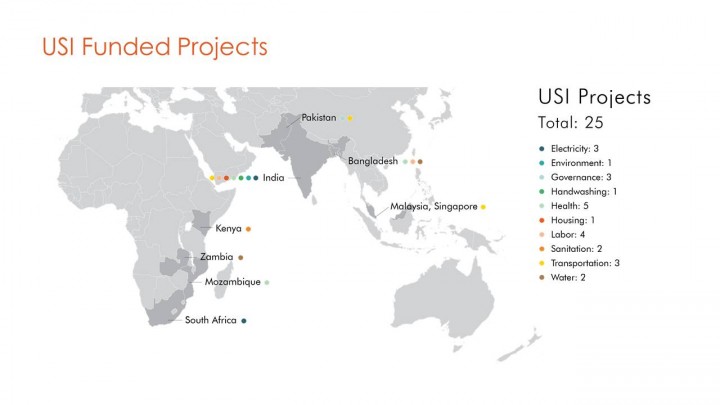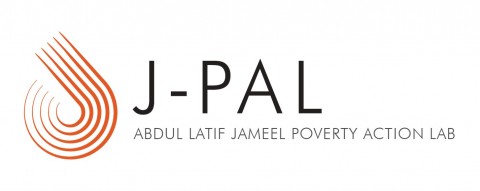Urban Services Initiative (USI)
2011 - 2018 • J-PAL (Abdul Latif Jameel Poverty Action Lab), Massachusetts Institute of Technology (MIT)
Purpose
To evaluate innovative methods designed to improve the welfare of the urban poor in Asia and Africa. The project covers, amongst other issues, water, sanitation, and hygiene, migrant integration and livelihoods, energy and the environment, transportation.
Activities
To identify and rigorously evaluate, through randomized controlled trials, innovative methods designed to improve the welfare of the urban poor in Asia and Africa. USI covers a broad range of urban issues including water, sanitation, and hygiene, migrant integration and livelihoods, energy and the environment, transportation, housing and infrastructure, and delivery of health and education services.
Those projects funded through USI with a focus on sanitation include the following:
(1)
Wastewater as a Collective Action Problem: Effluent Trading for Water Quality in Urban India
Researchers: Rohini Pande, Michael Greenstone, Nick Hagerty, Nicholas Ryan, Anant Sudarshan
Partner(s): Indian state pollution regulator and a common effluent treatment plant
Location: India
Timeline: 2014-2018
Type of Project: Full Study
The density that defines cities exacerbates collective action problems: my garbage litters your street, my sewage taints your drinking water. Households and firms often do not see the true cost that their waste imposes on others, which leads to excessive discharge. The resultant pollution of common resources, like waterways and reservoirs, imposes high costs on downstream residents. Researchers will investigate whether markets for pollution—specifically, the discharge of industrial effluent in urban India—can provide better incentives for conservation. Such trading markets have never been used to manage water pollution in India. Researchers will partner with an Indian state regulator and a common effluent treatment plant to set up a cap-and-trade system for effluent in a large group of industrial plants. Markets theoretically yield efficient water conservation, provided there are clear property rights and low transaction costs. Researchers will conduct a randomized evaluation of the initial allocation of discharge permits to test this fundamental relationship. This trial will provide policy guidance on the scope for market instruments to address collective action problems in public services with externalities from overuse.
(2)
Handwashing and Habit Formation
Researchers: Atonu Rabbani, Reshmaan Hussam, Giovanni Reggiani, Natalie Rigol
Partner(s):Society for Health and Demographic Surveillance, India
Location: India
Timeline: 2014-2015
Type of Project: Pilot Study
This project addresses poor hand hygiene, a leading driver of child mortality via bacterial and viral contamination and resulting diarrhea and acute respiratory infection. Public health campaigns focused on handwashing with soap have consistently failed to generate long term behavioral change, despite the effectiveness of the practice in clinical studies in improving health. In collaboration with the MIT Media Lab, researchers have developed an innovative measurement tool for handwashing that generates the precise data and feedback loop required to study and nurture systematic behavioral change via the habit loop; the project then employs this device across a large sample of households and nursery schools along with a series of incentive-driven interventions intended to generate sustained habit formation.
This pilot study will take place in West Bengal, India. The study intervention will target mothers and children below age five directly in their homes and through government-funded nurseries. The pilot study will randomize households into one of four treatment arms: 1) handwashing with soap and information, 2) treatment 1 plus monitoring, 3) treatment 2 plus incentives, and 4) treatment 3 plus self-commitment. Each treatment will be cross-randomized with a reminder treatment via text message. Immediate outcomes include frequency and timing of handwashing; long term outcomes include changes in household valuation for soap and detailed child-level health measures.
(3)
Creating a Toilet Habit
This sub-grant has been introduced on the forum here: forum.susana.org/forum/categories/71-beh...ya-j-pal-and-sanergy
Researchers: Mushfiq Mobarak, Judy Chevalier, Johann Caro Burnett
Partner(s): Sanergy
Location: Kenya
Timeline: 2013-2018
Type of Project: Full Study
Public health externalities from unhygienic sanitation remain a significant development challenge, even in areas where hygienic latrines are accessible or affordable. We hypothesize that behaviors like open defecation may persist because they represent ingrained habits that are difficult to change. Inspired by findings from psychology and neuroscience, we propose field experiments that are designed to instill a revised habit of community toilet use among the slum population of Nairobi. Our partner, Sanergy has created a network of hygienic latrines in Nairobi, but face a challenge of low demand for the toilets. Habit loops have been successfully created by private sector firms to increase demand for many household products and behaviors such as brushing regularly with Pepsodent toothpaste, or spraying Febreze air freshener. We propose to create such a loop for Sanergy toilets using a combination of economic incentives and a marketing campaign that is attentive to psychological cues and rewards. The experiments are designed to separate habit formation from other closely related models of risk aversion and learning.
(4)
Demand for Sanitation in Kenyan Urban Slums
Researchers: Paul Gertler, Sebastian Galiani
Partner(s): Athi Water and Sanitation Board, Nairobi, Kenya; The World Bank; Water and Sanitation Program
Location: Kenya
Timeline: 2014-2016
Type of Project: Full Study
We propose to study the demand for household connection to municipal sewage systems in informal slums in Nairobi, Kenya. Governments are investing in expensive sewerage systems to bring sanitation services to the household door. The cost-effectiveness of these investments depends on the number of households that connect to the sanitation systems. However, there are large fixed costs to connect to sewage systems including both the costs charged by the utility investment in household sanitation facilities, and pipes to connect from the house to the network. We propose to use a RCT to estimate price elasticity of the demand for connections, and the extent to which the price elasticity depends on information about the relationship between sanitation and health. We also consider complications related to collective action in multi-household compound connections, and resident versus non-resident landlords. Results from this study are critical to developing pricing/subsidy and information campaign policies to cost-effectively improve connectivity.
(5)
Eliciting Willingness-To-Pay for Point-of-Source In-Line Chlorinators in Low Income Areas of Urban Dhaka
Researchers: Jenna Davis, Stephen Luby, Amy Pickering, Atonu Rabbani, Leanne Unicomb
Partner(s): Stanford University; International Center for Diarrheal Diseases Research, Bangladesh (icddr,b)
Location: Bangladesh
Timeline: 2013-2015
Type of Project: Pilot Study
This project proposes estimating the willingness-to-pay for a novel water treatment device that is attached to a hand pump that draws water from the public water supply network. The water supply is often contaminated with impurity and pathogens and causes common water-borne diseases. The device will treat water through a pre-specified amount of chlorine as the water flows out of the pump. The device uses simple techniques and does not require any moving parts or electronics. The automatic In-Line Chlorinator is a novel innovation (designed and developed by Department of Civil and Environmental Engineering at Stanford University with local partnership of icddr,b in Bangladesh) and this project will contribute towards measuring WTPs for such devices at the compound level. The community level point-of-source water treatment devices have not been studied before. Both technical and social innovations of the device and a demand side analysis of the product will contribute towards designing a sustainable business model, which will enable a thorough and larger research design when the intervention is eventually scaled up.
(6)
A Tragedy of the Commons in the Household: Water Use and Intrahousehold Externalities
Researchers: Kelsey Jack, Seema Jayachandran
Partner(s): Southern Water and Sewerage Company
Location: Zambia
Timeline: 2013-2015
Type of Project: Pilot Study
A household’s water usage has negative externalities on community members and future community members when water resources are scarce and depletable. If piped water is delivered by a water utility, this externality can be addressed by setting the price equal to the marginal social cost. The household is paying the social cost on the margin. However, each individual within the household may not be paying that price. If individuals are not completely altruistic toward their family members or cooperation fails because of an inability to enforce individual consumption levels, then each will only partly internalize the price if the water bill is partly or fully paid by other family members. This is a challenging problem for a water utility to solve because the water is provided to a household, not an individual. There is an analogous problem with electricity or penalties for not recycling or any other case where a household’s behavior imposes externalities beyond the household and a service is provided to and priced at the household level. This motivates the research question for this project: Are households in which members are less altruistic toward each other less price sensitive in their water consumption?
Images

Image: Map of USI Funded Projects
Countries of activity
Location of main activity
Objectives
Encourage innovative projects designed to address the challenge of delivering urban services, and use randomized evaluations to test the effectiveness of those innovations in the field; Establish strong research teams, and increase capacity for some developing countries’ researchers to design and conduct rigorous, randomized evaluations to test the effectiveness of their proposed solutions; Disseminate knowledge learned from USI research to policymakers and donors at the local, national, and international levels, so that effective solutions are promoted and scaled-up.
Further information
Successfully executed seven competitive rounds of grantmaking, awarding over $3 million to 25 unique research projects.
Contact information
Ariella Park
Login to see the e-mail-adress of the contact person.
Filter tags
Behaviour change Bill & Melinda Gates Foundation Cities Community sanitation East Asia & Pacific Enabling environment and institutional strengthening Faecal sludge treatment processes Health and hygiene Market development Operation, maintenance and sustainable services Political processes and institutional aspects Public awareness, advocacy and civil society engagement Specific to one or several countries Sub-Saharan Africa University, education or research institution Urban (entire city) Urban informal settlements (slums)
Links

Uploaded by:
danijela milosevic (milli)















